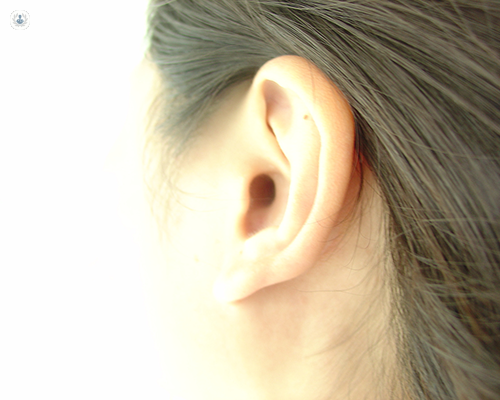An expert’s guide to ear infections and discharge
Autore:Ear infections can irritating, painful and have a sever impact on daily life. We speak to esteemed consultant ENT surgeon Professor Mahmood Bhutta who provides an expert guide to all things ear infections.
What is an ear infection, and what are the symptoms?
There are various different types of ear infections. Symptoms of these infections usually consist of discharge coming out of the ear, which at times is watery, or can be thick with pus. It can be common to experience some pain and some discomfort, as well as some hearing loss.

Such infections may include the outer ear; an ear infection affecting the ear canal, the tube that goes from this part of your ear towards the eardrum, or it can be a middle ear infection, a part of the ear that's deep in the eardrum where the bones of hearing reside.
What are the different types of ear discharge?
There are several different types of ear discharge and sometimes it can be difficult to know exactly what's causing it until we look inside the ear. In fact, in otology, the study of the ear is one of the few branches of medicine where it's actually very difficult to know exactly what's causing it until we look inside the ear.
The ear discharge may be a watery discharge associated with itchiness, which is typically an outer infection, as I've mentioned. On the other hand it might be pus/ things coming out of the year, which is usually a middle ear infection (the infection deep to the eardrum). If there's a lot of pain and a temperature before that comes out that can be what’s called an acute ear infection: an ear infection that's happened just recently and usually following a cold.
It gets inside the ear but sometimes there's people who just have pus pouring out of their ear from time to time with very little pain and that can be a sign that you've got a hole in your eardrum or you've got a rare problem called a cholesteatoma where the skin of the eardrum has started to grow inwards as well as causing a hole.
What can cause an ear infection, and what can cause ear discharge?
The causes of ear discharge can be varied, as previously mentioned. An outer infection can arise because water has got in, for example, it classically happens after swimming. The problem could be that you've got an underlying problem with the skin of the ear canal such as an eczema, which makes you prone to this. Speaking truthfully, sometimes we don't find out why you've got a near discharge from outer ear. If it's this
A middle ear infection, the infection deep to the eardrum, may arise because you have picked up a cold, causing intense pain, discharge and pus due to a burst eardrum. Certain people are just prone to this. It happens a lot in children because their immune systems are a little bit weaker, but it can also happen in adults and often we don't know why adults some adults are particularly prone to getting ear infections more than others.
Additionally, some people can also have a hole in the eardrum. For the majority of people that I see with a hole in the eardrum, we can't understand why they developed a whole new neutron. Sometimes it's because of a bad ear infection, when the eardrum has burst due to trauma. However, most people are just present with discharge coming out of the ear from time to time.
A hole can be find in the eardrum, without us knowing exactly what happened, but rarely it can be due to cholesteatoma, which is a bit of skin growing into the eardrum. Thankfully, this is rare but it's actually an active growth of a skin from the eardrum and when that starts, it keeps them going into the uterus and continues to grow, and can eventually damage various other structures in the ear or even rarely go up into the brain, therefore I always say to non-specialists to GPs and even to patients, if you've got an ear that continues to discharge, that doesn't settle or repeatedly discharges you must go and see an expert.
How are infections treated? Is ear discharge treated any differently?
Ear infections are treated slightly different to other infections, and the main stage of treatment should be antibiotic drops. Rather than giving you antibiotics by mouth which have to go into your body and then can get to the ear in lower concentrations. What we normally try to do is put antibiotic drops into the year, because we get a much higher concentration to get rid of any bacteria that are there. The same circumstances apply, whether it's for an outer infection or a middle ear infection and usually settles it down.
However, if it doesn't, you often need your ear cleaning out to get rid of any pus and debris inside, to allow the antibiotics to work even stronger. Occasionally we get infections that simply won't settle and keep coming back. For this reason, you should to see an expert, because if there's an underlying hole in the eardrum, you will be prone to getting repeated infections and the eardrum will need to be repaired. In addition, and you'll need to repair that eardrum or you may want to consider a repair of the eardrum to try and stop the problem and possibly improve your hearing as well.
If the problem is cholesteatoma that's the one condition where you really should have an operation because that's not going to go away and could cause more serious problems going forward and that requires usually a much bigger operation to actually open up the ear and remove all of that skin away.
How do infections and discharge that affect the middle ear differ from those of the outer ear?
Overall, it's quite difficult to differentiate exactly what's causing the infection. I think if it settles with some antibiotic drops and it doesn't come back then that's okay, but to differentiate between an outer and middle ear infection can be challenging. We really have to examine the ear: so sometimes you get some inkling that you've got some itching in your ear, which can be more of a discharge and discomfort: this may be a sign that it's an outer infection.
In some cases, you can actually see pus coming out of your ear, in which case that tends to be more of a middle ear infection. However, to be honest, sometimes you just can't tell the difference and as I say, if it just keeps on causing problems, you really should seek advice from an expert.
If you would like to book a consultation with Professor Bhutta, do not hesitate to do so by visiting his Top Doctors profile today.


